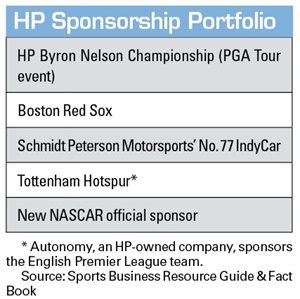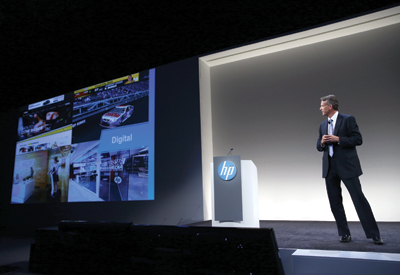HP has signed a three-year sponsorship deal with NASCAR and plans to collaborate with the sanctioning body to develop business solutions it can sell globally.
The agreement, which sources valued at $2 million to $3 million annually, makes HP Enterprise Services the sport’s official technology partner. The company is NASCAR’s first partner in that category and the first technology-related company it’s worked with since Ask.com exited its official deal in 2009.
 |
HP CEO Meg Whitman with NASCAR CMO Steve Phelps at the HP Discover conference
Photo by: HP |
The deal developed as a result of HP’s work with NASCAR creating the sport’s Fan & Media Engagement Center. The Charlotte-based center uses HP software and hardware to track and analyze social media trends so that the sport, tracks, teams and sponsors better understand fans.
HP developed the center for NASCAR without signing an official sponsorship, and it had limited rights to promote its ties to the sport. But it has begun pitching the Fan & Media Engagement services to clients and last week brought NASCAR chief marketer Steve Phelps to Las Vegas to speak about the center at HP Discover, an annual event showcasing the company’s products and business solutions to more than 10,000 business and government clients.
The company plans to use its sponsorship of NASCAR to develop additional technology and business innovations that it can then pitch to clients. It will hold quarterly meetings with NASCAR in which the parties discuss ways to “co-innovate” and develop technical solutions that help NASCAR’s business and the sport, said Charles Salameh, vice president and general manager of HP Enterprise Services, who drove the deal from the brand side.
“The partnership works as a lighthouse program,” Salameh said. “We’ll build technology in a real-world environment. … Rather than use a PowerPoint presentation [of what we have developed], we can say, ‘Come look at our partner NASCAR.’”
The approach marks a shift in the way HP approaches sports marketing. For years, its most visible sports marketing efforts centered on using athletes like Shaun White and Michael Phelps in advertisements designed to convince consumers to buy its PCs. It also sponsored the NBA from 2008 to 2012. The deal was the company’s first professional league sponsorship and it used the NBA to promote its laptops, which were used at scorers tables, and other products with NBA-themed advertising.
 |
But as the company’s PC and printing business divisions have stagnated in recent years, it has looked to drive future revenue by becoming a one-stop shop for corporations’ technology needs from computers and servers to networking and software. As a result, it’s less interested in using its NASCAR sponsorship to reach the sport’s fans than using NASCAR as a high-profile, business partner it can showcase to companies in which it wants to sell innovations that integrate its computers, servers and software. The company didn’t even make media or activation commitments to tracks, teams or drivers in its deal.
“This is not an opportunity for us to sell anything based on brand,” Salameh said. “It’s an opportunity to showcase how technology helps businesses solve problems. Our real focus is to look at the challenging business issues NASCAR faces — whether that’s tracking their fans or providing their sponsors with more insight into how fans see sponsorships at a race — we are there to help solve that problem. This is why the Fan & Media Engagement Center was created. There could be other business challenges that NASCAR has that could have relevance to other companies.”
The approach HP is taking with NASCAR is common in the world of Formula One where teams like Lotus and Red Bull partner with Microsoft and Siemens, respectively, to use their technologies to improve car speed and measure the durability of auto parts. Most of those deals are value-in-kind agreements, and the brands use their ties to the teams to promote their technology expertise to business clients.
HP dabbled in that world when it sponsored the Williams BMW F1 team from 2002 to 2005 and the Renault F1 team in 2011 and 2012, but the NASCAR deal represents a different spin on that formula.
The company didn’t work with an agency on its NASCAR deal, and it doesn’t plan to work with an agency in the future. The deal comes on the heels of its decision to exit its arena naming-rights deal in San Jose 2 1/2 years before the 15-year, $47 million deal officially ended.
 |
NASCAR’s Steve Phelps discussed the Fan & Media Engagement Center at HP Discover in Las Vegas.
Photo by: HP |
The deal is NASCAR’s second major sponsorship agreement this year. It announced a multiyear deal with Sherwin-Williams last month. It’s also the sport’s eighth new partner in the last year. But perhaps most important, HP gives NASCAR its first technology partner, which is a category NASCAR Chairman Brian France has pushed his sales team to fill for two to three years.
“It’s a major step in technology and innovation for NASCAR,” said Jim O’Connell, NASCAR’s chief sales officer. “The joint commitment we’re making to bring innovation to the sport fulfills Brian’s vision. It’s a logical next step [for NASCAR]. We’ve had a lot of success in building green partnerships, and this is the first step in what we believe will be a successful process in adding technology and innovation partners.”
NASCAR began making a deliberate push to engage technology companies two years ago. It partnered with Google in 2012 on the company’s April Fool’s joke and partnered with Twitter to create a designated page that aggregates NASCAR-related tweets.
HP is the first partnership that it has converted from a non-cash agreement to a traditional sponsorship. NASCAR officials and track and team executives hope that the deal opens the door to other Silicon Valley-based companies, which don’t have a history of sports sponsorship but do have a huge place in the U.S. economy.
“This is a first step, and it’s a really significant step,” O’Connell said.






